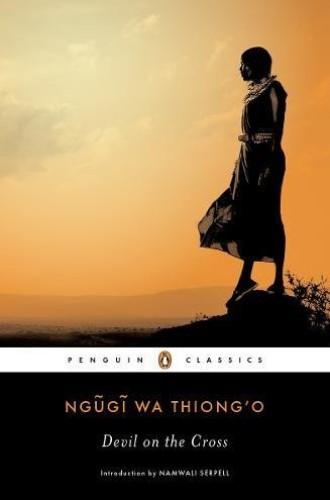A novel about the evils of capitalism
There’s nothing subtle about Ngũgĩ wa Thiong’o’s Marxist critique of life in postcolonial Kenya.
Two Penguin Classics currently sit on my “favorites” shelf: Alastair Hannay’s translation of Kierkegaard’s Fear and Trembling and R. S. Pine-Coffin’s translation of Augustine’s Confessions. I now have a third Penguin Classics volume to add to the shelf (and that’s not a decision I make lightly!). It’s Ngũgĩ wa Thiong’o’s novel Devil on the Cross, newly reissued as a part of the Penguin African Writers Series.
The novel is as beautifully complex and delightfully genre-bending as Confessions and Fear and Trembling. But it isn’t driven by the same questions of religious faith that haunted Augustine and Kierkegaard. Rather, it grapples with human selfishness in relationship to the economic and social systems that shape postcolonial Kenya. Although solidly situated within its own context, the book raises ethical questions that many Americans are now asking as we watch our political leaders make policy decisions aimed at increasing their own power and profit.
The Marxism that drives the novel—which Ngũgĩ first wrote on scraps of toilet paper while imprisoned for his political views in 1978—is far from subtle. It’s downright blatant. The book reads like a morality tale (or, to be fair to the narrative’s complex structure, morality tales within morality tales within a morality tale). As one of the characters explains while recounting a fable that an old man told him:
The ogre’s job was to eat and thereafter to sleep soundly on the back of the peasant. As the peasant became progressively thinner and more depressed at heart, the ogre prospered and flourished, to the extent of being inspired to sing hymns that exhorted the peasant to endure his lot on Earth with fortitude, for he would later find his rest in Heaven.
There is no subtlety here about the effects of capitalism on Kenyan society both during and after British rule. As the protagonists become intertwined in a competition of thieves and robbers, the pedagogical tone of their conversations escalates. So do the outlandish caricatures of the devilish capitalists they encounter. One successful businessman boasts:
There has never been any civilization that was not built on the foundations of theft and robbery. Where would America be today without theft and robbery? What about England? France? Germany? Japan? It’s theft and robbery that have made possible the development of the Western world. Let’s not be fooled by socialist cant. To banish theft and robbery from a country is to stifle progress.
Another wealthy man, whose “legs are huge and shapeless, like giant banana stems or the legs of someone who is suffering from elephantiasis,” and whose “neck is formed from rolls of fat, like the skin of the hairy maggot,” argues for the establishment of a farm with machines to milk the blood, sweat, and brains of the workers who are imprisoned there. The owner “will construct pipelines. The blood will be poured into them and a machine will pump it to the importing foreign countries, just like petroleum oil!” Meanwhile, in the surrounding villages, “the churches, the schools, the poetry, the songs, the cinema, the beer halls, the clubs, the newspapers will all act as brain-washing poisons whose purpose will be to convince the workers that in this world there is nothing as glorious as slavery.”
The narrative revolves around a retelling of the parable of the talents in which, prior to leaving the country, the master teaches his loyal servants “all the earthly wiles he knew, and especially the trick of sprinkling theft and robbery with the sweetest-smelling perfumes, and the trick of wrapping poison in sugar-coated leaves, and many tricks for dividing the country’s workers and peasants through bribery and appeals to tribe and religion.” (Sounds a lot like a certain former candidate’s presidential campaign.)
Today, as we respond to the White House’s federal budget proposal, we could do worse than to pick up a compellingly-written novel about the dangers of capitalism and mass inequality. The qualities that drive the devils in this book—entitlement, the lust for power over other people, and greed—are ones that we might easily identify in our own time.
Or even in ourselves. One character says quite simply, “mass famine is jewelry for the wealthy.” In that equation, if I honestly assess myself, I am more likely to be the one wearing the jewelry than the one suffering famine. Indeed, Ngũgĩ’s point is that no single political leader is to blame for the injustices in which we are all complicit. It’s easy to point the finger at narcissistic buffoon-like public figures, but I am also one of the ogres portrayed in this book.
The fact that it so unflinchingly shows me my own sinfulness is exactly why this novel deserves a place next to Confessions and Fear and Trembling.






